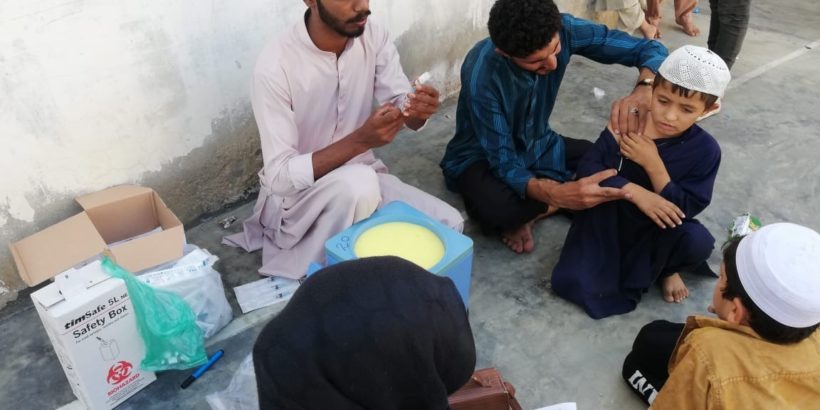Photo: A boy receives typhoid conjugate vaccine (TCV) in Sindh Province, Pakistan, during the campaign in 2019. TCVs are a promising tool to combat rising rates of drug-resistant typhoid.
Like most things in 2020, the American Society for Tropical Medicine and Hygiene (ASTMH) annual conference was a bit different this year. Due to the global COVID-19 pandemic, the conference was entirely virtual. The spread of COVID-19 has not slowed down the everyday threat of typhoid for millions who live in typhoid-endemic areas. Similarly, the virtual nature of the conference did not hinder the sharing and discussion of important scientific information. Researchers provided updates on typhoid surveillance, drug resistance, and typhoid conjugate vaccine (TCV) efficacy, safety, and delivery across dozens of different presentations and posters at ASTMH 2020. A few key themes are summarized below.
Typhoid causes a significant health burden that is growing due to drug resistance.
New estimates from the Global Burden of Disease study project that typhoid caused more than 9 million infections and 110,000 deaths in 2019. These were mostly among children in low-resource settings in Asia and Africa. While typhoid is treatable with appropriate antibiotics, drug-resistant typhoid is increasing globally. Preventing typhoid with vaccines is now more urgent than ever.
At ASTMH, several researchers presented data showing that single- and multidrug-resistant typhoid strains are increasing and the burden of typhoid may be higher than once thought. New evidence of drug-resistant typhoid came from Ghana, DRC, Nepal, Bangladesh, India, Pakistan, and worldwide. A systematic review highlighted the considerable morbidity burden of typhoid due to its long-term consequences. The review also found higher case-fatality ratios in Africa due to delays and limitations in typhoid diagnosis and treatment.
Typhoid conjugate vaccines provide robust protection in high-burden settings.
New typhoid conjugate vaccines (TCVs)–which are suitable for children younger than two years of age, allowing for inclusion in routine childhood immunization programs—became available in 2018. As of 2019, countries are beginning to introduce them.
Encouragingly, new findings from TCV studies presented at ASTMH confirm that the vaccines have a strong safety and efficacy profile among children. Across Malawi, Nepal, and India, preliminary TCV efficacy was estimated around 80% (publications coming soon!). A study in Burkina Faso found a strong immune response when TCV was co-administered with routine measles-rubella and meningococcal A vaccines.
Introducing TCVs in routine immunization programs is possible—and the best way to stop drug resistance.
In Zimbabwe, a study found that vaccination with TCV may help reduce the prevalence of decreased ciprofloxacin susceptibility. This finding is a positive sign that TCVs can help stop drug-resistant typhoid. Updates from introduction efforts in Pakistan, which became the first country to introduce TCV in 2019, highlighted how widespread TCV vaccination is possible. A regional introduction in Navi Mumbai, India, showed promise as well.
As 2020 comes to a close and the promise of COVID-19 vaccines moves us closer to ending the pandemic, the promise of TCVs feels closer than ever, too. Zimbabwe and Liberia are both planning introductions of TCV in 2021—a milestone that underscores the importance of continuing to advance routine immunization and primary health care despite the pandemic. Or even, perhaps, because of the pandemic.
TCVs are a readily available tool to take on the threat of drug-resistant typhoid. Armed with evidence such as the important studies presented at ASTMH this year, we can help make typhoid immunization a reality for millions of children in the years to come.



